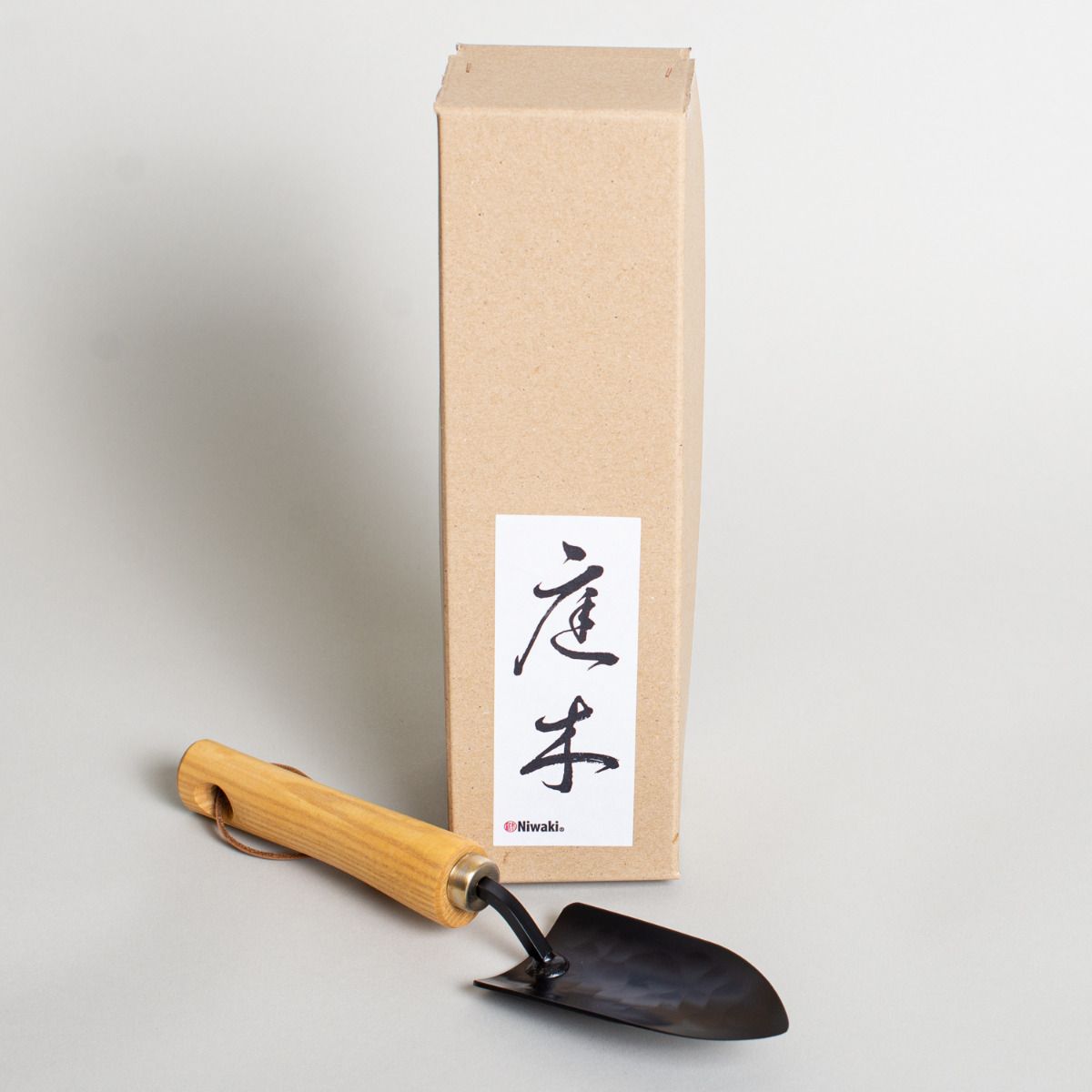Niwaki - Moku Trowel Small
Forged by father and son team in Sanjo, Niigata.
- Geschmiedet von Vater und Sohn Team in Sanjo, Niigata.
Hand forged trowel for the greenhouse, conservatory
or light garden use - but not for digging in heavy or
unbroken soils
173g
277 x 51 x 33mm
Carbon Steel
Ash handles
Made in Sanjo, Japan
***
Handgeschmiedete Kelle für das Gewächshaus, den Wintergarten
oder den leichten Gartengebrauch - aber nicht zum Graben in
schweren oder ungebrochenen Böden
173g
277 x 51 x 33 mm
Kohlenstoffstahl
Griffe aus Esche
Hergestellt in Sanjo, Japan
Niwaki
(EN) How it all began
1997. Jake goes to Japan as a wannabe sculptor, to investigate the cultural phenomenon of the cherry blossom season, hanami. There he discovers the gardens, and the trees, and vows to learn more.
Back home in England, he trains as a TEFL teacher, meets Keiko, and drags her back to Japan. Year one is spent teaching, year two working at a traditional plant nursey in a rural part of Osaka, learning all about tree training, pruning and rootballing.
The name
Niwaki means garden tree. Not very exciting, but it implies far more than that. Japanese gardens are landscapes, microcosms of nature, and the trees are all shaped to fit into those landscapes - there’s an awful lot of artistry and cultural baggage in there too. Niwaki founder Jake has written a book on it all, if you’re interested. So, the name. Hard to pronounce (ni-whacky) and tricky to remember, but we like it because of its implications.
The stuff
Almost everything in the range is stuff the Niwaki crew use themselves. Jake’s first day of pine pruning in Osaka, he was given a pair of garden scissors, still sharp as anything, more than a decade later. Brother-in-law Haruyasu bought Jake his first pair of Japanese shears, and he’s rarely used anything else since.
We love their tools too. Our absolute favourite is the kneeler. Rugged kneeler in heavy duty, weatherproof canvas (finally we can ditch the crappy plastic ones that last halve a season) . Five glorious centimetres of spongyness protect your knees from cold, wet or hard ground, and keep you clean - perfect for the garden but also makes a great cushion for picnics and around the campfire.
(DE ) Wie alles begann
1997. Jake reist als Möchtegern-Bildhauer nach Japan, um das kulturelle Phänomen der Kirschblütenzeit, hanami, zu erforschen. Dort entdeckt er die Gärten und die Bäume und schwört, mehr zu lernen.
Zurück in England lässt er sich zum TEFL-Lehrer ausbilden, lernt Keiko kennen und schleppt sie zurück nach Japan. Im ersten Jahr unterrichtet er, im zweiten Jahr arbeitet er in einer traditionellen Gärtnerei in einem ländlichen Teil von Osaka und lernt alles über Baumpflege, Baumschnitt und Wurzelballenbildung.
Der Name
Niwaki bedeutet Gartenbaum. Das ist nicht sehr aufregend, aber es bedeutet viel mehr als das. Japanische Gärten sind Landschaften, Mikrokosmen der Natur, und die Bäume sind so geformt, dass sie sich in diese Landschaften einfügen - da steckt eine Menge Kunstfertigkeit und kulturelles Gepäck drin. Niwaki-Gründer Jake hat ein Buch darüber geschrieben, falls Sie daran interessiert sind. Also, der Name. Er ist schwer auszusprechen (ni-whacky) und schwer zu merken, aber wir mögen ihn wegen seiner Aussagekraft.
Der Stoff
Fast alles, was in der Produktpalette enthalten ist, wird von der Niwaki-Crew selbst verwendet. Als Jake in Osaka zum ersten Mal Kiefern beschnitt, bekam er eine Gartenschere, die auch nach mehr als einem Jahrzehnt noch scharf wie eh und je ist. Schwager Haruyasu kaufte Jake seine erste japanische Schere, und seitdem hat er kaum etwas anderes benutzt.
Auch wir lieben ihre Werkzeuge. Unser absoluter Favorit ist die Knieschere. Eine robuste Knieschere aus strapazierfähigem, wetterfestem Segeltuch (endlich können wir uns von den beschissenen Plastikscheren trennen, die nur eine halbe Saison halten). Fünf herrliche Zentimeter Schwammigkeit schützen Ihre Knie vor Kälte, Nässe oder hartem Boden und halten Sie sauber - perfekt für den Garten, aber auch ein tolles Kissen für Picknicks und am Lagerfeuer.

